| Listing 1 - 8 of 8 |
Sort by
|
Book
ISBN: 019853213X 9780198532132 Year: 1991 Volume: 15 Publisher: Oxford Clarendon
Abstract | Keywords | Export | Availability | Bookmark
 Loading...
Loading...Choose an application
- Reference Manager
- EndNote
- RefWorks (Direct export to RefWorks)
Arithmetic --- Model theory --- Foundations. --- -Model theory --- Logic, Symbolic and mathematical --- Mathematics --- Set theory --- Calculators --- Numbers, Real --- Foundations --- Model theory. --- Foundations of arithmetic --- Philosophy --- Arithmetic - Foundations.
Book
ISBN: 038797489X 354097489X 1441930957 147574143X Year: 1991 Publisher: New York (N.Y.) : Springer,
Abstract | Keywords | Export | Availability | Bookmark
 Loading...
Loading...Choose an application
- Reference Manager
- EndNote
- RefWorks (Direct export to RefWorks)
517.986.2 --- Nonstandard mathematical analysis --- Sheaf theory --- Cohomology, Sheaf --- Sheaf cohomology --- Sheaves, Theory of --- Sheaves (Algebraic topology) --- Algebraic topology --- Analysis, Nonstandard mathematical --- Mathematical analysis, Nonstandard --- Non-standard analysis --- Nonstandard analysis --- Model theory --- Topological algebras (rings) and their continuous representations --- Nonstandard mathematical analysis. --- Sheaf theory. --- 517.986.2 Topological algebras (rings) and their continuous representations
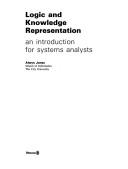
ISBN: 0273031503 Year: 1991 Publisher: London Pitman
Abstract | Keywords | Export | Availability | Bookmark
 Loading...
Loading...Choose an application
- Reference Manager
- EndNote
- RefWorks (Direct export to RefWorks)
Expert systems (Computer science) --- Logic, Symbolic and mathematical --- Systèmes experts (Informatique) --- Logique symbolique et mathématique --- 681.3*F41 --- 681.3*I24 --- Mathematical logic: computability theory; computational logic; lambda calculus; logic programming; mechanical theorem proving; model theory; proof theory;recursive function theory--See also {681.3*F11}; {681.3*I22}; {681.3*I23} --- Knowledge representation formalisms and methods: frames and scripts; predicate logic; relation systems; representation languages; procedural and rule-based representations; semantic networks (Artificial intelligence) --- 681.3*I24 Knowledge representation formalisms and methods: frames and scripts; predicate logic; relation systems; representation languages; procedural and rule-based representations; semantic networks (Artificial intelligence) --- 681.3*F41 Mathematical logic: computability theory; computational logic; lambda calculus; logic programming; mechanical theorem proving; model theory; proof theory;recursive function theory--See also {681.3*F11}; {681.3*I22}; {681.3*I23} --- Systèmes experts (Informatique) --- Logique symbolique et mathématique
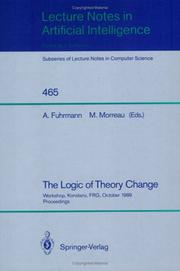
ISBN: 3540535675 354046817X Year: 1991 Publisher: Berlin Springer
Abstract | Keywords | Export | Availability | Bookmark
 Loading...
Loading...Choose an application
- Reference Manager
- EndNote
- RefWorks (Direct export to RefWorks)
The logic of theory change, or the theory of belief revision, is a growing area of research in artificial intelligence. The papers in this volume, mostly arising from a workshop held in Konstanz in October 1989, chart out the current state of research in this area and indicate the directions of future research. Connections to other areas of AI research are emphasized throughout the book. All the contributions are original research papers and most of them are self-contained, so that the collection will be of interest not only to researchers but also to all those who seek an introduction to the state of the art in this area. The fourteen contributions are organized into five sections: - Foundations - Models of theory change - The Ramsey test for conditionals - Theory change and nonmonotonic reasoning - Reformulations and extensions.
681.3*F41 --- 681.3*I23 --- Mathematical logic: computability theory; computational logic; lambda calculus; logic programming; mechanical theorem proving; model theory; proof theory;recursive function theory--See also {681.3*F11}; {681.3*I22}; {681.3*I23} --- Deduction and theorem proving: answer/reason extraction; reasoning; resolution; metatheory; mathematical induction; logic programming (Artificial intelligence) --- 681.3*I23 Deduction and theorem proving: answer/reason extraction; reasoning; resolution; metatheory; mathematical induction; logic programming (Artificial intelligence) --- 681.3*F41 Mathematical logic: computability theory; computational logic; lambda calculus; logic programming; mechanical theorem proving; model theory; proof theory;recursive function theory--See also {681.3*F11}; {681.3*I22}; {681.3*I23} --- Artificial intelligence. --- Computer science. --- Artificial Intelligence. --- Models and Principles. --- Informatics --- Science --- AI (Artificial intelligence) --- Artificial thinking --- Electronic brains --- Intellectronics --- Intelligence, Artificial --- Intelligent machines --- Machine intelligence --- Thinking, Artificial --- Bionics --- Cognitive science --- Digital computer simulation --- Electronic data processing --- Logic machines --- Machine theory --- Self-organizing systems --- Simulation methods --- Fifth generation computers --- Neural computers
Multi
ISSN: 10469567 ISBN: 1558601651 9781558601659 Year: 1991 Volume: vol *5 Publisher: San Mateo, Calif. Morgan Kaufmann Publishers
Abstract | Keywords | Export | Availability | Bookmark
 Loading...
Loading...Choose an application
- Reference Manager
- EndNote
- RefWorks (Direct export to RefWorks)
Knowledge representation (Information theory) --- Reasoning --- 681.3*F41 --- 681.3*I23 --- 681.3*I24 --- 681.3*I24 Knowledge representation formalisms and methods: frames and scripts; predicate logic; relation systems; representation languages; procedural and rule-based representations; semantic networks (Artificial intelligence) --- Knowledge representation formalisms and methods: frames and scripts; predicate logic; relation systems; representation languages; procedural and rule-based representations; semantic networks (Artificial intelligence) --- 681.3*I23 Deduction and theorem proving: answer/reason extraction; reasoning; resolution; metatheory; mathematical induction; logic programming (Artificial intelligence) --- Deduction and theorem proving: answer/reason extraction; reasoning; resolution; metatheory; mathematical induction; logic programming (Artificial intelligence) --- 681.3*F41 Mathematical logic: computability theory; computational logic; lambda calculus; logic programming; mechanical theorem proving; model theory; proof theory;recursive function theory--See also {681.3*F11}; {681.3*I22}; {681.3*I23} --- Mathematical logic: computability theory; computational logic; lambda calculus; logic programming; mechanical theorem proving; model theory; proof theory;recursive function theory--See also {681.3*F11}; {681.3*I22}; {681.3*I23} --- Congresses --- Knowledge representation (Information theory) - Congresses. --- Reasoning - Congresses. --- Knowledge representation (Information theory) - Congresses --- Reasoning - Congresses --- Non-Classical Logic --- Temporal Logic --- Frame Problem --- Non Monotonic Logic --- Modal Logic
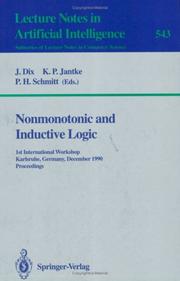
ISBN: 3540545646 0387545646 3540384693 Year: 1991 Volume: vol 543 vol *55 Publisher: Berlin Springer
Abstract | Keywords | Export | Availability | Bookmark
 Loading...
Loading...Choose an application
- Reference Manager
- EndNote
- RefWorks (Direct export to RefWorks)
This proceedings volume contains revised and reviewed papers based on talks presented at the first International Workshop on Nonmonotonic and Inductive Logic held in Karlsruhe, December 1990. The workshop was supported by the Volkswagen-Stiftung, Hannover, and provided a forum for researchers from the two fields to communicate and find areas of cooperation. The papersare organized into sections on: - Nonmonotonicity in logic programs - Axiomatic approach to nonmonotonic reasoning - Inductive inference - Autoepistemic logic - Belief updates The bulk of the papers are devoted to nonmonotonic logic and provide an up-to-date view of the current state of research presented by leading experts in the field. A novelty in the contributions from the area of inductive logic is the analysis of nonmonotonicity in the theory of inductive learning.
Artificial intelligence --- -Logic programming --- -681.3*F41 --- 681.3*I23 --- 681.3*I26 --- Computer programming --- AI (Artificial intelligence) --- Artificial thinking --- Electronic brains --- Intellectronics --- Intelligence, Artificial --- Intelligent machines --- Machine intelligence --- Thinking, Artificial --- Bionics --- Cognitive science --- Digital computer simulation --- Electronic data processing --- Logic machines --- Machine theory --- Self-organizing systems --- Simulation methods --- Fifth generation computers --- Neural computers --- Congresses --- Mathematical logic: computability theory; computational logic; lambda calculus; logic programming; mechanical theorem proving; model theory; proof theory;recursive function theory--See also {681.3*F11}; {681.3*I22}; {681.3*I23} --- Deduction and theorem proving: answer/reason extraction; reasoning; resolution; metatheory; mathematical induction; logic programming (Artificial intelligence) --- Learning: analogies; concept learning; induction; knowledge acquisition; language acquisition; parameter learning (Artificial intelligence)--See also {681.3*K32} --- 681.3*I26 Learning: analogies; concept learning; induction; knowledge acquisition; language acquisition; parameter learning (Artificial intelligence)--See also {681.3*K32} --- 681.3*I23 Deduction and theorem proving: answer/reason extraction; reasoning; resolution; metatheory; mathematical induction; logic programming (Artificial intelligence) --- 681.3*F41 Mathematical logic: computability theory; computational logic; lambda calculus; logic programming; mechanical theorem proving; model theory; proof theory;recursive function theory--See also {681.3*F11}; {681.3*I22}; {681.3*I23} --- Logic programming --- 681.3*F41 --- Logic programming - Congresses. --- Artificial intelligence - Congresses. --- Artificial intelligence. --- Logic design. --- Logic, Symbolic and mathematical. --- Artificial Intelligence. --- Logics and Meanings of Programs. --- Mathematical Logic and Foundations. --- Design, Logic --- Design of logic systems --- Digital electronics --- Electronic circuit design --- Logic circuits --- Switching theory --- Algebra of logic --- Logic, Universal --- Mathematical logic --- Symbolic and mathematical logic --- Symbolic logic --- Mathematics --- Algebra, Abstract --- Metamathematics --- Set theory --- Syllogism
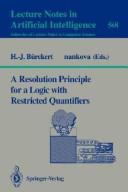
ISBN: 0387550348 3540550348 3540466703 Year: 1991 Volume: vol 568 vol *60 Publisher: Berlin New York Paris Springer-Verlag
Abstract | Keywords | Export | Availability | Bookmark
 Loading...
Loading...Choose an application
- Reference Manager
- EndNote
- RefWorks (Direct export to RefWorks)
This monograph presents foundations for a constrained logic scheme treating constraints as a very general form of restricted quantifiers. The constraints - or quantifier restrictions - are taken from a general constraint system consisting of constraint theory and a set of distinguished constraints. The book provides a calculus for this constrained logic based on a generalization of Robinson's resolution principle. Technically, the unification procedure of the resolution rule is replaced by suitable constraint-solving methods. The calculus is proven sound and complete for the refutation of sets of constrained clauses. Using a new and elegant generalization of the notion ofa ground instance, the proof technique is a straightforward adaptation of the classical proof technique. The author demonstrates that the constrained logic scheme can be instantiated by well-known sorted logics or equational theories and also by extensions of predicate logics with general equational constraints or concept description languages.
Automatic theorem proving --- Logic, Symbolic and mathematical --- 681.3*F41 --- 681.3*I23 --- 681.3*I24 --- Algebra of logic --- Logic, Universal --- Mathematical logic --- Symbolic and mathematical logic --- Symbolic logic --- Mathematics --- Algebra, Abstract --- Metamathematics --- Set theory --- Syllogism --- Automated theorem proving --- Theorem proving, Automated --- Theorem proving, Automatic --- Artificial intelligence --- Proof theory --- Mathematical logic: computability theory; computational logic; lambda calculus; logic programming; mechanical theorem proving; model theory; proof theory;recursive function theory--See also {681.3*F11}; {681.3*I22}; {681.3*I23} --- Deduction and theorem proving: answer/reason extraction; reasoning; resolution; metatheory; mathematical induction; logic programming (Artificial intelligence) --- Knowledge representation formalisms and methods: frames and scripts; predicate logic; relation systems; representation languages; procedural and rule-based representations; semantic networks (Artificial intelligence) --- Automatic theorem proving. --- Logic, Symbolic and mathematical. --- 681.3*I24 Knowledge representation formalisms and methods: frames and scripts; predicate logic; relation systems; representation languages; procedural and rule-based representations; semantic networks (Artificial intelligence) --- 681.3*I23 Deduction and theorem proving: answer/reason extraction; reasoning; resolution; metatheory; mathematical induction; logic programming (Artificial intelligence) --- 681.3*F41 Mathematical logic: computability theory; computational logic; lambda calculus; logic programming; mechanical theorem proving; model theory; proof theory;recursive function theory--See also {681.3*F11}; {681.3*I22}; {681.3*I23} --- Information theory. --- Artificial intelligence. --- Computer science. --- Theory of Computation. --- Artificial Intelligence. --- Mathematical Logic and Formal Languages. --- Mathematical Logic and Foundations. --- Informatics --- Science --- AI (Artificial intelligence) --- Artificial thinking --- Electronic brains --- Intellectronics --- Intelligence, Artificial --- Intelligent machines --- Machine intelligence --- Thinking, Artificial --- Bionics --- Cognitive science --- Digital computer simulation --- Electronic data processing --- Logic machines --- Machine theory --- Self-organizing systems --- Simulation methods --- Fifth generation computers --- Neural computers --- Communication theory --- Communication --- Cybernetics
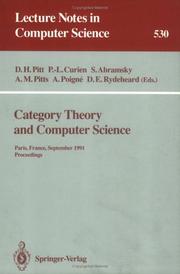
ISBN: 354054495X 3540384138 038754495X Year: 1991 Publisher: Berlin Springer
Abstract | Keywords | Export | Availability | Bookmark
 Loading...
Loading...Choose an application
- Reference Manager
- EndNote
- RefWorks (Direct export to RefWorks)
The papers in this volume were presented at the fourth biennial Summer Conference on Category Theory and Computer Science, held in Paris, September3-6, 1991. Category theory continues to be an important tool in foundationalstudies in computer science. It has been widely applied by logicians to get concise interpretations of many logical concepts. Links between logic and computer science have been developed now for over twenty years, notably via the Curry-Howard isomorphism which identifies programs with proofs and types with propositions. The triangle category theory - logic - programming presents a rich world of interconnections. Topics covered in this volume include the following. Type theory: stratification of types and propositions can be discussed in a categorical setting. Domain theory: synthetic domain theory develops domain theory internally in the constructive universe of the effective topos. Linear logic: the reconstruction of logic based on propositions as resources leads to alternatives to traditional syntaxes. The proceedings of the previous three category theory conferences appear as Lecture Notes in Computer Science Volumes 240, 283 and 389.
Categories (Mathematics) --- Computer science --- Congresses. --- -Computer science --- -681.3*D21 --- 681.3*D31 --- 681.3*D33 --- 681.3*F3 --- 681.3*F41 --- Informatics --- Science --- Congresses --- Requirements/specifications: languages; methodologies; tools (Software engineering)--See also {681.3*D31} --- Formal definitions and theory: semantics; syntax (Programming languages)--See also {681.3*D21}; {681.3*F31}; {681.3*F32}; {681.3*F42}; {681.3*F43} --- Languages constructs: abstract data types; concurrent programming structures;control structures; coroutines (Programming languages) --- Logics and meanings of programs (Theory of computation) --- Mathematical logic: computability theory; computational logic; lambda calculus; logic programming; mechanical theorem proving; model theory; proof theory;recursive function theory--See also {681.3*F11}; {681.3*I22}; {681.3*I23} --- 681.3*F41 Mathematical logic: computability theory; computational logic; lambda calculus; logic programming; mechanical theorem proving; model theory; proof theory;recursive function theory--See also {681.3*F11}; {681.3*I22}; {681.3*I23} --- 681.3*F3 Logics and meanings of programs (Theory of computation) --- 681.3*D33 Languages constructs: abstract data types; concurrent programming structures;control structures; coroutines (Programming languages) --- 681.3*D31 Formal definitions and theory: semantics; syntax (Programming languages)--See also {681.3*D21}; {681.3*F31}; {681.3*F32}; {681.3*F42}; {681.3*F43} --- 681.3*D21 Requirements/specifications: languages; methodologies; tools (Software engineering)--See also {681.3*D31} --- 681.3*D21 --- Mathematics. --- Information theory. --- Logic design. --- Computer science. --- Software engineering. --- Mathematics, general. --- Theory of Computation. --- Logics and Meanings of Programs. --- Mathematical Logic and Formal Languages. --- Programming Languages, Compilers, Interpreters. --- Software Engineering. --- Computer software engineering --- Engineering --- Design, Logic --- Design of logic systems --- Digital electronics --- Electronic circuit design --- Logic circuits --- Machine theory --- Switching theory --- Communication theory --- Communication --- Cybernetics --- Math
| Listing 1 - 8 of 8 |
Sort by
|

 Search
Search Feedback
Feedback About
About Help
Help News
News